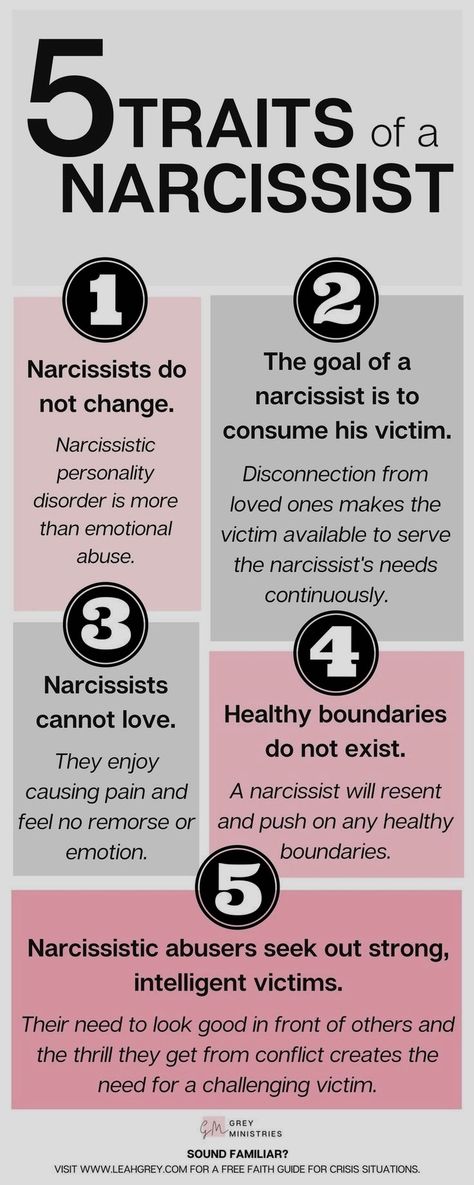How to work for a narcissist
The Dos and Don'ts of Working for a Narcissist Boss
Narcissists are attracted to power and status, and they can be skilled at conveying confidence, exploiting opportunities, and moving up the professional ranks. This means there is a pretty good chance you'll find yourself working for one at some point along the way. Here are strategies to get the most out of the relationship while avoiding the worst pitfalls of day-to-day life with a narcissistic boss.
Dos
1. Do educate yourself about narcissism. For most of us, the underlying psychology of the narcissistic personality is extremely difficult to comprehend.
Emotionally, narcissists are developmentally impaired young children who lack empathy, self-awareness, emotional regulation, and stable self-esteem. They see life in black and white, think hierarchically, and are driven by repressed shame and an exaggerated compensatory persona of superiority and entitlement. Your narcissistic boss doesn't just believe he is better and more deserving than you: His identity and self-esteem balance on that belief.
2. Do identify your boss's brand of narcissism. Overtly domineering narcissists are easy to spot because of their flagrant demands for attention and control. But more covert narcissists are passive-aggressive and often go to great lengths to conceal their selfishness and cultivate a do-gooder public image.
3. Do validate your boss. Narcissists need a continuous flow of attention and admiration to function. Like hot-air balloons, they need others to inflate them to stay afloat.
Validate your boss whenever and however you can. Point out strengths and successes and offer praise and positive feedback.
4. Do manage your expectations. Although your boss expects validation from you, don't expect her to return the favor. Your desire for recognition and respect is normal, but giving others genuine validation with no strings attached is beyond the narcissist's playbook. The sooner you accept that reality, the easier it will be to manage the day-to-day.
5. Do align your success with your boss's success. As unfair as it is, your boss only cares when there is something in it for him and will take ownership of your good ideas and hard work. Find ways to align your success with his, so he feels invested in you doing well.
6. Do minimize conflict. Narcissists tend to create drama as a way to get attention and manipulate others, and their take-no-prisoners approach often leads to conflict. Do what you can to avoid and prevent problems before they happen, and beyond that, try to keep your head down and stay out of the fray.
7. Do be reliable, professional, and self-assured. This isn't always easy, especially when your boss is doing the opposite, but you will need to bring your A-game to work.
Your narcissistic boss will hold you to unreasonably high standards and always look for areas of weakness to exploit or attack. Don't give her ammunition by showing up late, dressing inappropriately, or displaying your self-doubts.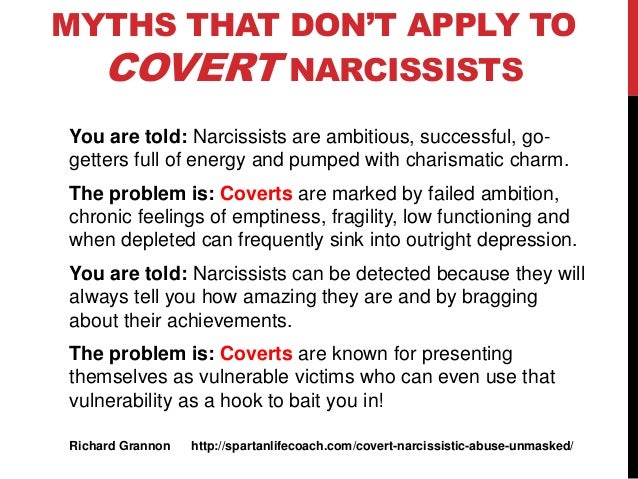 When she goes low, you go high.
When she goes low, you go high.
8. Do consider your boundaries. Narcissists violate boundaries as a matter of course. Whether your boss burdens you with responsibilities beyond your job description or asks you to do something unethical, think about what you are and are not willing to do for the job and be prepared to accept the consequences of holding those boundaries. Document violations and share details with someone you trust, so you have evidence if you need to report abuse.
9. Do have outlets outside of work. No one should have to tolerate the personal assaults that define life with a narcissistic personality. Make sure to have outlets to discharge the frustration and support yourself with healthy routines and good self-care. Build in rest, exercise, creative pursuits, connections with nature, and time with loved ones.
10. Do make an exit strategy. Working for a narcissist is ravaging to one's self-esteem and personal agency. No matter how skilled you may become at managing the situation, it takes a heavy toll on your emotional and physical health.
No matter how skilled you may become at managing the situation, it takes a heavy toll on your emotional and physical health.
Your boss won't stop pushing you to impossible standards, won't play fair, and won't grow a conscience. You owe it to yourself to find a way to put this job in the rear-view mirror.
Don'ts
1. Don't expect fair play or reciprocity. Narcissists flout rules, violate ethics, steal ideas, conduct smear campaigns, disavow responsibility, and project and deny their own behavior without a second thought.
2. Don't expect loyalty. Narcissists expect loyalty from others without earning or returning it. Your boss will not have your back, no matter how much he may tell you he is your champion.
3. Don't criticize. The number-one rule about narcissists is that they dish it out but can't take it. The narcissist is the first to fault and blame others while being the last to accept critical feedback or take responsibility. Even a hint of criticism, such as questioning an idea they have, can trigger rage or a host of passive-aggressive punishments.
Even a hint of criticism, such as questioning an idea they have, can trigger rage or a host of passive-aggressive punishments.
4. Don't show your vulnerability. Narcissists view life as a war zone, with survival at stake and everyone out for themselves. If you share your feelings or lower your guard, your boss will file the information and use it against you one way or another.
5. Don't take things personally. Things can feel very personal with narcissists. They inflate your flaws, leverage your vulnerability, play on your hopes, and compulsively project their own issues and emotions onto you.
But the bottom line with narcissists is that it's all about them. They don't see you, don't think about your needs other than how they can manipulate them, don't care about your life beyond their place in it, and ultimately relate everything back to themselves.
6. Don't expect credit. In narcissists' zero-sum-game mindset, giving credit to others represents a personal loss for them.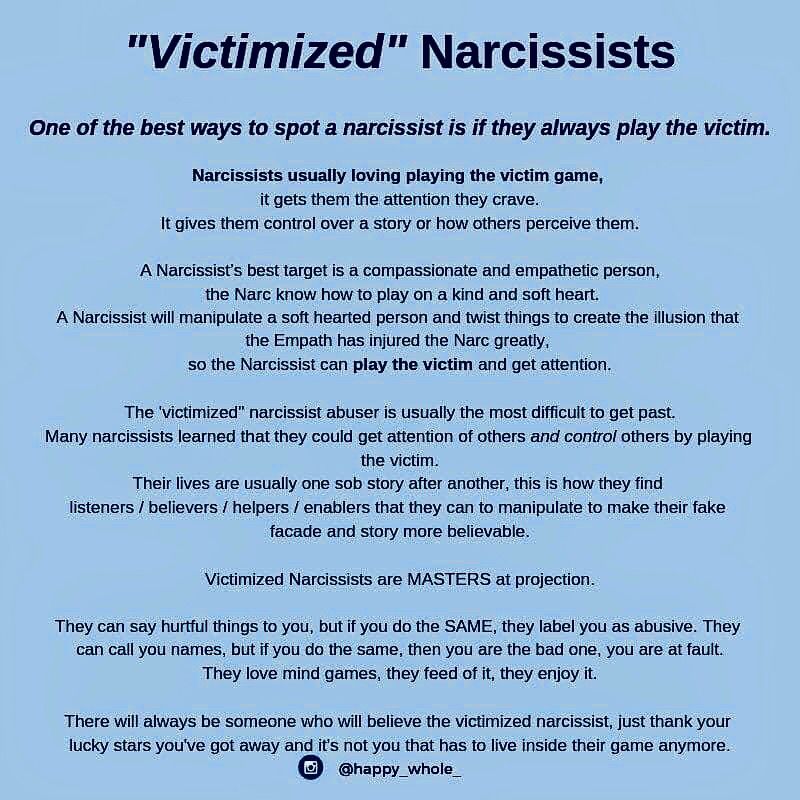 Don't expect credit from your boss, and if someone else credits you, be prepared for your boss to take ownership of it.
Don't expect credit from your boss, and if someone else credits you, be prepared for your boss to take ownership of it.
7. Don't try to justify, explain, or excuse yourself. Arguing a point or explaining why you're late or missed a deadline is futile and likely to elicit impatience or contempt. The narcissist does not care about your reasons and sees your defense as a weakness to be attacked.
8. Don't fawn. Your boss wants your validation and may look to you for bolstering and praise, but be careful not to sound insincere. Narcissists are hypervigilant, and above all, can't abide looking foolish or out of control.
9. Don't put your self-esteem on the line. We all need to feel a sense of purpose and competence in the work we do, but your worth as a human being should never be part of the equation. Don't let your boss make it feel that way.
10. Don't give up on yourself. With a narcissistic boss, you may come from a background with narcissistic parents or other traumatic circumstances. Children from such families often replay the dynamics they grew up with in their personal and professional adult relationships until they gain enough awareness to break the pattern. If this resonates with you, seek more information and help. Healing begins with awareness.
Children from such families often replay the dynamics they grew up with in their personal and professional adult relationships until they gain enough awareness to break the pattern. If this resonates with you, seek more information and help. Healing begins with awareness.
How to Work with a Narcissist (When you Have No Choice) | by Dr. Nicole Lipkin
They walk among us.
They look like normal people.
That’s what makes dealing with a narcissist so difficult. You are typically caught in their web before you realize who and what ensnared you.
If you don’t already, the chances of you working with a narcissist at some point in your career are very high. In fact, research has shown that narcissism is on the rise and has been for quite a while.
In our society, we tend to reward and promote the qualities exhibited by narcissism, mistaking confidence for competence, and arrogance for achievement.
To be clear, I am talking about clinical narcissism as a disorder, classified in the DSM asNarcissistic Personality Disorder. This is not to be confused with mere grandiosity or conceitedness.
This is not to be confused with mere grandiosity or conceitedness.
Narcissists don’t have the telltale signs of a crazy person: they’re not sitting at coffee shops writing manifestos on napkins in an illegible scrawl, shouting about aliens.
Quite the contrary. They are often charming, talented, attractive people who have a natural allure to them. They can be great motivators and group leaders, with a flare for inspiring others. A narcissist in the workplace can work wonders at times. They have a fire in their belly, a zest to get things done!
That is, until they lose interest or something doesn’t go their way. Then all hell can break loose.
If they do not get what they want or they feel attacked, they will lash out with every fiber of their being until the other party surrenders, apologizes, and admits they were wrong — which, by the way, are all actions a narcissist will never take.
What if you are forced to work with a narcissist and must deal with them? What if you are already ensnared and unsure about how to proceed?
Here are some methods to help you cope when you have no choice but to cope:
I put this first because it will be the last thing on your mind when you have a narcissist in your life. The important thing to remember is this is a sick person. They would not act this way if they had a healthy ego.
The important thing to remember is this is a sick person. They would not act this way if they had a healthy ego.
It’s easy to have compassion for the blatantly insane; it’s much harder to extend it towards the insidiously insane. The narcissist was significantly bruised at some point in their early childhood — typically by a caregiver — and is at heart a child trying to gain acceptance and love from everyone they meet.
Hang around a narcissist long enough and you will get bruised. You will want to bruise back. Pick your battles.
A narcissist’s ego is extremely fragile. Wounds and bruises cut deeper than you can imagine; they lack the antibodies to heal from these wounds. Seeking an apology is a fruitless endeavor. Taking the high road is often a necessary strategy when dealing with a narcissist.
Don’t expect a clean bow-tie resolution to a conflict. Don’t expect them to come around to your point of view when in conflict with them. Recognize you may walk away feeling crazy, as narcissists are expert argument manipulators and logic twisters.
Manage your need to win, to prove yourself right. Learn how to heal yourself. These are great skills to learn anyway.
This is the first rule of the Narcissist Companion’s Club. The narcissist’s entire life has been built around the notion that they definitively know who they are, when in fact they don’t have a fully formed self. If they feel their façade is under attack they will launch a counter-attack.
Ironically, you will probably be called a narcissist by a narcissist before you even get the chance to consider calling them a narcissist. Narcissists love calling other people narcissists. It’s almost as if their unconscious knows to throw out this insult first to weaken any subsequent claim against them.
If you have to deal with a narcissist you will need to practice detachment. When they hurt your feelings you will want to say something; you will feel the natural desire to express how they made you feel.
Recognize, however, you may end up feeling worse than you did before you said something. You can of course say whatever you want, but your main goal shouldn’t be to seek an apology, as you most likely will not receive one. In fact, you may end up apologizing to them for something you didn’t see coming.
You can of course say whatever you want, but your main goal shouldn’t be to seek an apology, as you most likely will not receive one. In fact, you may end up apologizing to them for something you didn’t see coming.
Better to see everything they do and say in the light of mental illness: abnormal behavior characterized by feelings of superiority, a need for admiration and a lack of empathy. By emotionally detaching you can effectively shape your conversations and your reactions.
It is crucial that you set clear parameters. Your agenda matters just as much as theirs. A narcissist will take advantage of you any chance they get. It is simply their nature. Drop the guilt you may feel about setting boundaries. You are protecting yourself from feeling resentment down the line when you find yourself doing more work than you signed up for while they reap the benefits.
The narcissist may try to bend your boundaries, seeing what they can get out of you. Keep your boundaries strong and intact.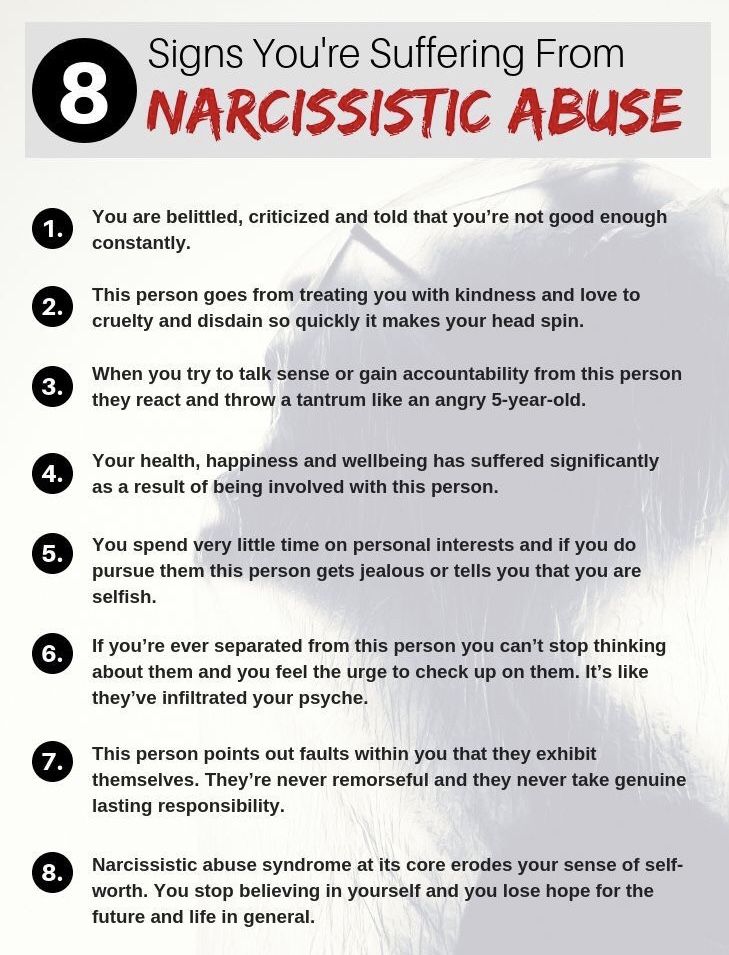
In a normal scenario, when a friend or colleague is acting grandiose you might be able to bring them down to earth, but there’s no point in jumping in front of the narcissism train. Let it roll along right past you.
For better or worse, when the narcissist in your life is happy you’re likelier to be happy as well. There’s no harm in staying in their favor, even if it feels inauthentic. Sometimes self-preservation is more important than self-sacrifice. You don’t have to be a truth or morality crusader, fighting the good fight at every turn. You’ll exhaust yourself.
If they’re not hurting anyone or anything let them believe what they want.
If their behavior goes too far, report it to HR or seek counsel.
If their actions impede a project, recruit others to help set it on the right track. You may have to give them a little credit or help them feel it was their idea to prevent the backlash. Frustrating? Yes. Worth keeping your own sanity in tact? Even more yes.
When push comes to shove the narcissist is going to use everything in his/her arsenal that they think will keep you from leaving them. Your greatest asset when dealing with a narcissist is to truly not need them in your life.
If the separation requires an open declaration you might find yourself dodging hideous threats. This is their backwards way of keeping you in their life. If you do not need anything they have, if you can walk away in good conscience and wash your hands of them you are in a good place.
There are some upsides to working with narcissists. They often have a tremendous drive for new, exciting projects. They can inspire and lead. If they dangle an enticing project in front of you it’s not always the wrong move to turn them down. You just have to be very clear about expectations, responsibilities, and if relevant, money.
Another upside to dealing with a narcissist is we learn how to skillfully navigate irrational waters. You might learn how to coolly collect information before jumping into the fray. You learn how to be clear about your own needs.
You learn how to be clear about your own needs.
You learn there’s sometimes peace of mind in surrendering your ego. Narcissists have a way of tapping into your own self-importance. Maybe we welcomed the praise they sent our way? Maybe we readily acknowledged their suggestion that something about us is better than others, that we are special?
They force you to grow and stretch yourself. You should be thanking them! They’re definitely wondering why you haven’t already.
I’d love to hear your thoughts and experiences with narcissism in the workplace. Please share!
Follow Nicole on Twitter, Facebook, LinkedIn, and Instagram.
Sign up for my free newsletter here to receive insights about fueling leadership through neuroscience and psychology.
Nicole Lipkin, Psy.D., MBA is an organizational psychologist and the CEO of Equilibria Leadership Consulting. She is the author of “What Keeps Leaders Up At Night” and the co-author of “Y in the Workplace: Managing the ‘Me First’ Generation.”
She is the author of “What Keeps Leaders Up At Night” and the co-author of “Y in the Workplace: Managing the ‘Me First’ Generation.”
How to work with narcissists: advice from a psychiatrist
Anton Bakharev
When faced with unpleasant or strange behavior from colleagues, we either give up or lose patience and lose our temper. What can you do to make your life easier? Psychiatrist and business consultant Jodie Foster talks about 10 "problem" personality types and gives specific advice on how to deal with difficult situations in the book Assholes Under Control.
Consider one of the most common of them and its three varieties. nine0004
Narcissism
Narcissism itself is not bad. In psychiatry, this concept comes down to high self-esteem. This trait is essential for new beginnings and success. Narcissism is one of the core qualities of the human experience. However, going beyond the reasonable, it becomes a problem.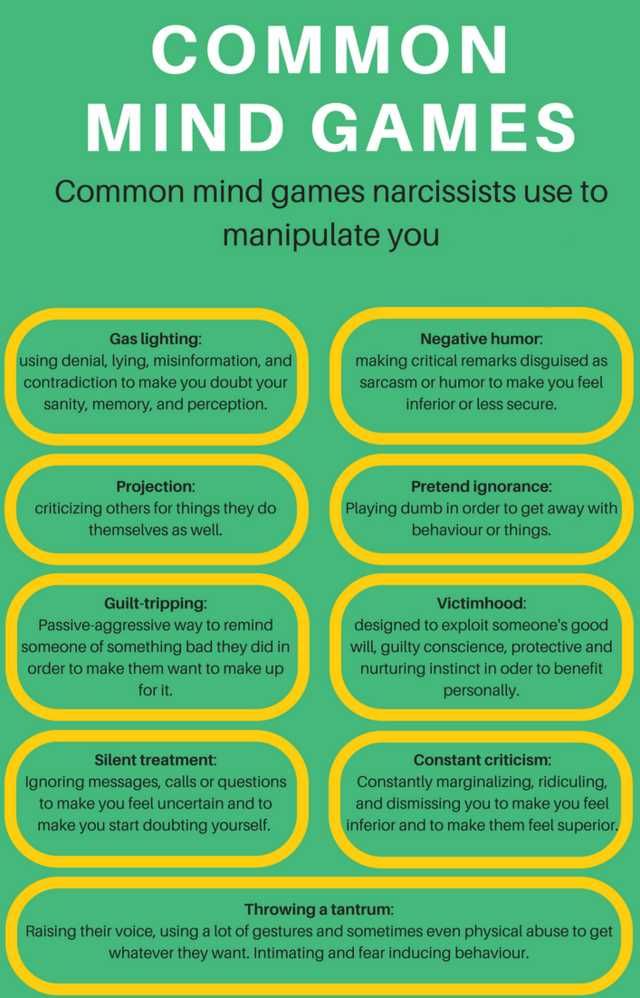
Healthy narcissism helps us get into law school, enroll in guitar classes, or get our first date. Without faith in yourself, it is impossible to dream or make plans. Lack of a healthy dose of narcissism makes us think something like, “I won’t go to law school. I'm too stupid", "I'll never learn how to play the guitar" or "Yes, she'll piss me off." nine0004
Narcissism becomes uncontrollable, impudence, egocentrism, arrogance begin to dominate. In other words, the ego comes to the fore and is fueled by praise and vanity. Problems with narcissism appear when a person becomes unable to ask for help, first dates don't turn into second dates, and guitars break if they don't sound right after a week of practice.
Narcissistic disorders affect approximately 6.2% of the population (a very high rate) and 50-75% of them are men. nine0004
All types of Narcissists have a very fragile personality behind their blatant arrogance, desperate for recognition. Where a person with healthy self-esteem feels good, the Narcissist tries to compensate for the lack of confidence.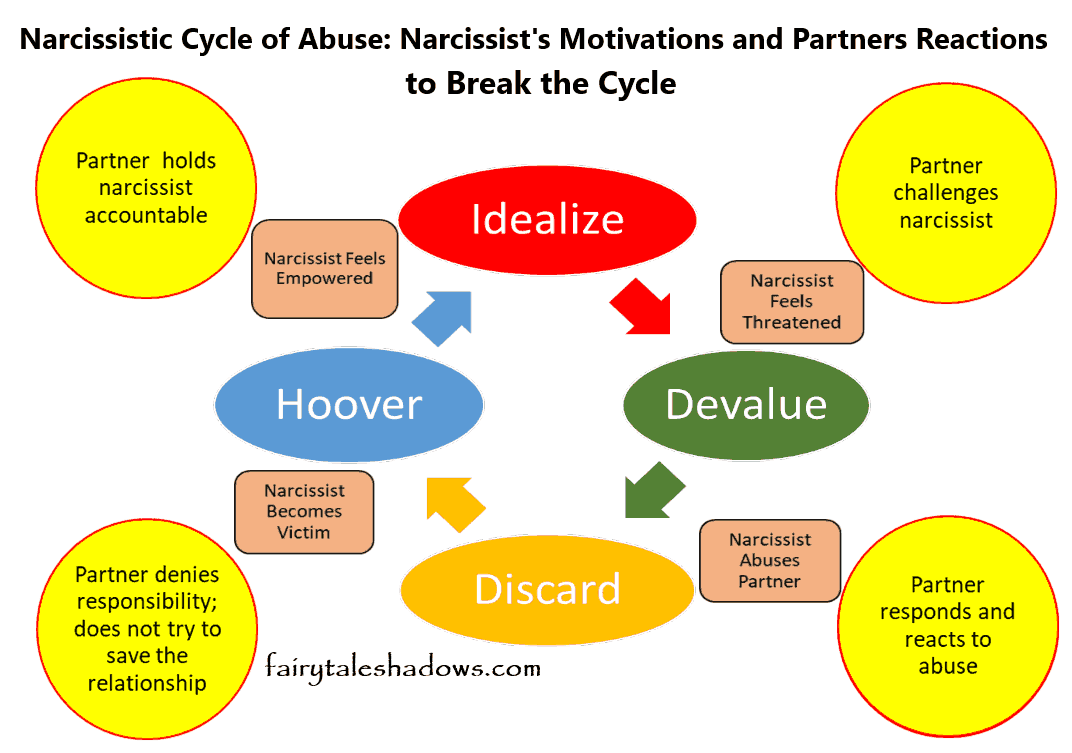 An ordinary person stands firmly on his feet and can praise himself from time to time. The narcissist needs the constant approval of others. In everyday life, we perceive Narcissists as people with too high conceit. In fact, they only seem to be focused on themselves. This is a defensive reaction, the causes of which lie in low self-esteem. nine0004
An ordinary person stands firmly on his feet and can praise himself from time to time. The narcissist needs the constant approval of others. In everyday life, we perceive Narcissists as people with too high conceit. In fact, they only seem to be focused on themselves. This is a defensive reaction, the causes of which lie in low self-esteem. nine0004
Narcissist "beloved"
How do "beloved" Narcissists manifest themselves in a team? For example, they may be adept at asking for compliments. Appearing in the office in full dress, they hint that they overslept and put on the first thing that came to hand. This is said to get a portion of admiration: “You have a beautiful haircut and a great shirt! And in general, you always look good.” Sounds like "You are our beloved!"
Not only Narcissists can ask for compliments, but this tactic is typical for people with low self-esteem. The praise of others lifts their spirits. Of course, we all talk about ourselves from time to time, but the “beloved” Narcissist tends to do this endlessly. "I did this and that." "I have this." "I'm going to buy something." And we are already thinking in desperation: “He is on his own again…” Sidelong glances, heavy sighs of colleagues are signs that they are again hearing an endless monologue about themselves. nine0004
"I did this and that." "I have this." "I'm going to buy something." And we are already thinking in desperation: “He is on his own again…” Sidelong glances, heavy sighs of colleagues are signs that they are again hearing an endless monologue about themselves. nine0004
You try to react, but Narcissus grabs all your remarks like prey and feeds them to his stories. “Yes, yes, it reminded me how I…” This is how Narcissus feels important. He seems to be calling: "Pay attention to me!" It seems to him that people are interested in listening to him, that he entertains society with stories about his own achievements. A narcissist is unlikely to take an interest in your affairs, and if he asks anything, it is only in the hope of getting a short answer. He also forgets everything you told him about yourself. nine0004
They say about such people: “He listens only to himself.” At the same time, to emphasize their superiority or hurt someone's pride, the Narcissist may bury his head on the phone or paint his nails when others are talking. Such behavior seems to tell us: “I don’t have to delve into this. I do not need it. I am above it."
Such behavior seems to tell us: “I don’t have to delve into this. I do not need it. I am above it."
If you managed to insert at least a few words about yourself in a conversation with a Narcissist, you are likely to fall out of favor and be criticized. “Well, I think it’s good for you… If I needed it, I would do it, but I don’t like such things…”
Their achievements are diamonds, yours are mere coals.
In a sense, this is a standard strategy for maintaining an advantage. You say that you are doing something - he says that he does it better. The narcissist may even accuse you of being jealous or otherwise undermine your authority by elevating himself.
These people are very fond of expressing insults in the form of a joke.
“I was hoping they would send me a nicer helper,” Narcissus chuckles, making the person feel helpless and hurt. nine0004
Another tricky tactic is to quickly change the topic of conversation so that you don't have time to mention your accomplishments.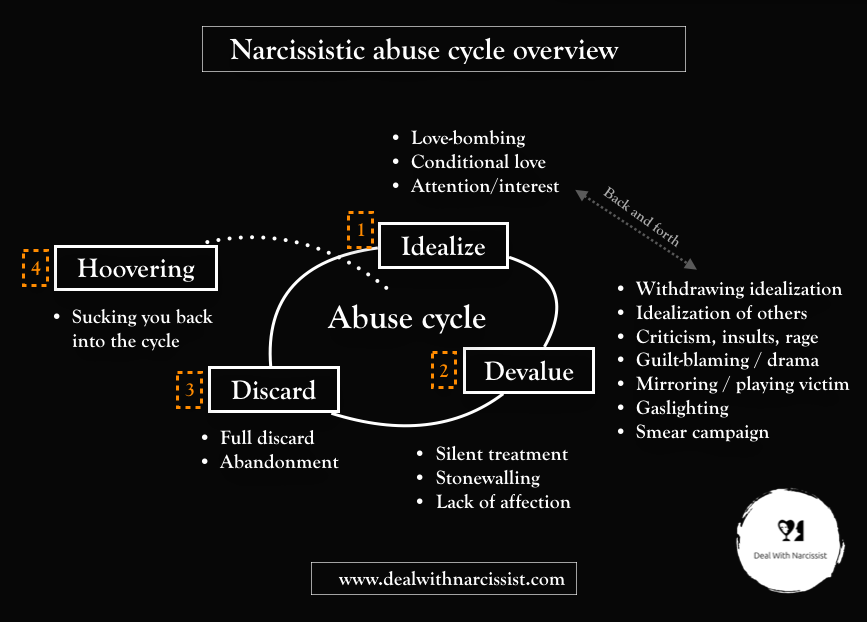 It seems quite innocent to remark like “I heard they are going to change the elevators in the building,” made suddenly after your story about your recent success. In fact, it is unsettling and may mean that Narcissus has appeared in your office.
It seems quite innocent to remark like “I heard they are going to change the elevators in the building,” made suddenly after your story about your recent success. In fact, it is unsettling and may mean that Narcissus has appeared in your office.
The main concern of the Narcissist (the essence of this personality type) is to maintain his significance and confidence. Therefore, he avoids open competition: God saves the safe. Failure, especially public failure, is a heavy blow for Narcissus. For fear of failure, he also avoids more covert competition. For example, does not take on big projects or does not ask for a raise for fear of not living up to expectations. Better not to fight and convince yourself that you would win it than to try and fail. nine0004
Narcissist "unhappy"
Narcissist "unhappy" manifests differently than Narcissus "beloved", but the gap between external confidence and low self-esteem remains unchanged. The indulgence of one's desire to receive comfort from Narcissus "unfortunate" is stronger than the unshakable arrogance of Narcissus "beloved".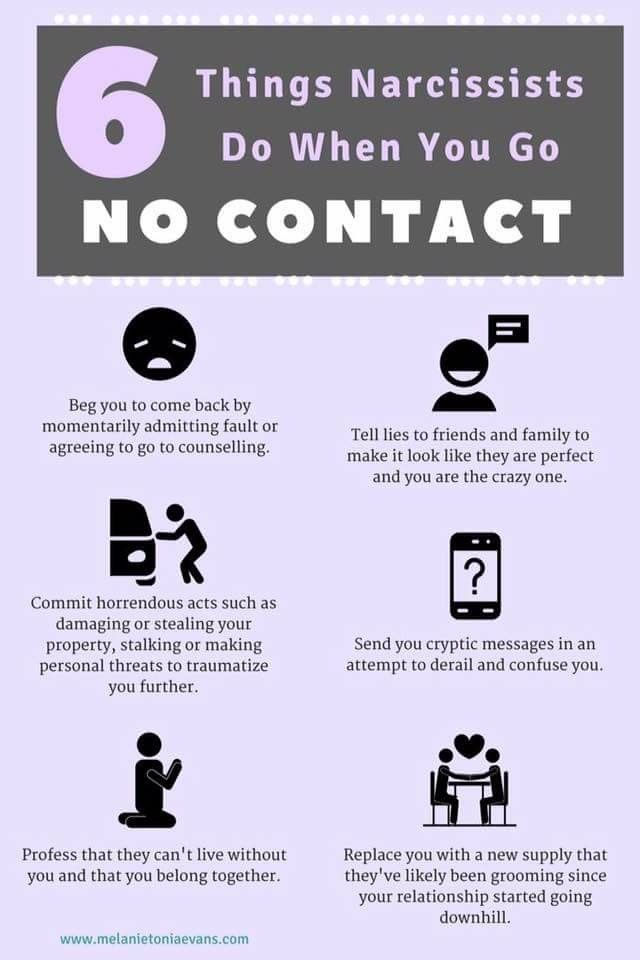
He can describe in detail how the doctor assured him that he had never seen such a severe manifestation of carpal tunnel syndrome before. Moreover, even talking about health problems, he manages to be self-centered and narcissistic. nine0004
The “unfortunate” narcissist seeks approval by uniting people who are ready to support him. So he can remain popular, and his name is well known. And all in order to please people, to be loved and respected, to hear approvals that support his self-esteem.
"Impossible" narcissist
The "impossible" narcissist is simply unable to think of anything but himself. This type has an extremely low level of empathy. He always blames others for his troubles and considers himself right in everything. No interventions or life tests help him recognize his behavior patterns. Such people prefer either not to have relationships at all, or to continue them within well-defined boundaries. While other Narcissists may at times be aware of the deep roots of their insecurities, the "impossible" Narcissist doesn't even think about them.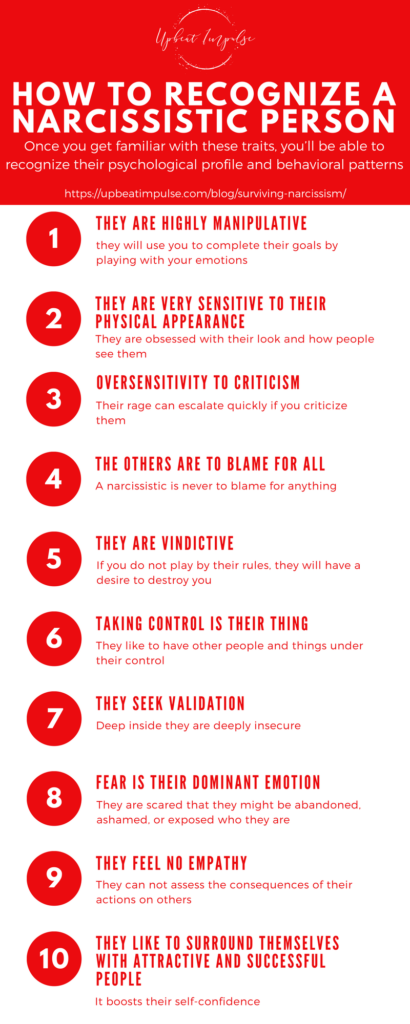 This is his self-defence. He guards his self-esteem by not allowing negative thoughts about himself. This defense mechanism does not allow him to perceive criticism and see his shortcomings, and therefore excludes the desire to correct them. If you have an “impossible” Narcissus in your team, then it is unlikely that he will stay for a long time. The depth of his problem does not allow him to gain a foothold in the workplace. nine0004
This is his self-defence. He guards his self-esteem by not allowing negative thoughts about himself. This defense mechanism does not allow him to perceive criticism and see his shortcomings, and therefore excludes the desire to correct them. If you have an “impossible” Narcissus in your team, then it is unlikely that he will stay for a long time. The depth of his problem does not allow him to gain a foothold in the workplace. nine0004
What it takes to work successfully with a Narcissist
- Be generous with compliments. This will help the Narcissist relax and prevent outbursts of anger.
- Insert comments, suggestions or criticism between praises. Then Narcissus will be able to hear her.
- Respond promptly to requests and invitations from Narcissus. Try not to ignore it.
- If possible, do not create situations in which the Narcissist can appropriate your merit or put you in a bad light. nine0066
- Invite the Narcissist to take the place of another person or look at his emotions from the side.
 This is useful for understanding behavioral disturbances.
This is useful for understanding behavioral disturbances. - Implement structural changes. Encourage teamwork over individual action, maintain transparency in task completion, and avoid special treatment of the Narcissist.
- Present the measures taken as an opportunity to succeed, rather than methods for correcting Narcissus' shortcomings. This will help him get involved in the process. nine0066
Based on the book Assholes Under Control.
Pictures of the post - source.
How to work with Narcissus. Assholes under control
If you have a potential Narcissist at work, then there are behavioral strategies that will help mitigate his egocentric impulses. Each of these approaches implies a certain type of business relationship. That is, not every method is suitable, for example, for use by a trainee in relation to a manager. If he is a Narcissist, then do not skimp on compliments and be ready to give in. But when the Narcissist is your subordinate, clearly define the boundaries and acceptable norms of the relationship. Between colleagues it is better to use an integrated approach. There are plenty of other schemes to try as well (some of which involve fawning over or approaching another leader to emphasize the need for action). nine0004
Between colleagues it is better to use an integrated approach. There are plenty of other schemes to try as well (some of which involve fawning over or approaching another leader to emphasize the need for action). nine0004
The constant impact on the self-esteem of such people is very effective. Notice the achievements and merits of the employee, periodically emphasize his importance. You yourself may want to celebrate the good work of Narcissus, because this will help to avoid fits of anger and rude remarks. Fanning the embers of narcissism helps prevent unwanted conflicts. In particular, if your boss is a Narcissist, show how important his authority is. Remember: such a person can make the life of anyone who disagrees with them a real hell, so praise him and try not to take these praises as a mockery. nine0004
If you are asking for a favor or anything that the Narcissist might take as an insult, be sure to include praise. Without it, the Narcissist practically does not perceive the comments. Even a reminder of the deadlines for completing tasks should bring positive enthusiasm. For example, say, "I can't wait until Friday to finally see your project." Remember: Narcissists are immune to criticism. Any offer or reminder that does not contain anything positive can be interpreted by him as an insult. nine0004
Even a reminder of the deadlines for completing tasks should bring positive enthusiasm. For example, say, "I can't wait until Friday to finally see your project." Remember: Narcissists are immune to criticism. Any offer or reminder that does not contain anything positive can be interpreted by him as an insult. nine0004
Another way to build a relationship with Narcissus is to pay more attention to him. Because the lack of interest in his person is also perceived as criticism. Even a wish for a good weekend can have a positive effect on business relationships. It's also important to respond when the Narcissist approaches you. If he asks to come to his office, do it immediately, postponing listening to other voice messages. Saying that you are very busy, and showing up a little later, you send a signal to Narcissus, which he interprets as: "I'm doing something important here, much more important than you, because, frankly, I'm not interested in you at all." And it will cause a wave of anger. When you arrive at his office five minutes later, he will seethe with anger and load you with new tasks in retaliation for your insolence. The same applies to responses to SMS messages, letters and other means of communication. A quick response gives the Narcissist confidence that you appreciate him. nine0004
When you arrive at his office five minutes later, he will seethe with anger and load you with new tasks in retaliation for your insolence. The same applies to responses to SMS messages, letters and other means of communication. A quick response gives the Narcissist confidence that you appreciate him. nine0004
Of course, this is annoying. No one wants to pander to Narcissus, because it is not so easy and seems highly unfair. The question is: why do you need to dance to someone else's tune? Yes, simply because it works. Otherwise, swearing, harassment or humiliation awaits you. As difficult as it may be to please a Narcissist, remember that it will only get worse if you don't.
When dealing with Narcissus, do not forget about the possible deterioration of relations. Pay attention to him, give him compliments, but know that he will easily sacrifice you for the sake of his goals. This is especially true if the Narcissist has an attractive appearance. Of course, no one encourages you to live in constant tension, but understanding this will protect you from disappointment or help protect your copyrights. For example, double check to see if your name is on the design documents you sent to Narcissus, or even include a third party in the correspondence. This will deprive Narcissus of the opportunity to pass off your work as his own. nine0004
For example, double check to see if your name is on the design documents you sent to Narcissus, or even include a third party in the correspondence. This will deprive Narcissus of the opportunity to pass off your work as his own. nine0004
Keep your emotions in check and try to avoid spontaneous reactions when dealing with a Narcissist. Thoughtless skirmishes can lead to your subsequent proposals being ignored or criticized before you even have a chance to say a word. The narcissist does not want to hear anything that can hurt his self-importance. The best way to present criticism to Narcissus is to insert it between praise. For example, something like this: “I really enjoyed your morning presentation. Exhaustive and informative. But perhaps colleagues will be more attentive and receptive if you refrain from calling all their questions stupid. It hurts the senses and distracts from the important information you want to convey. And I wouldn't want to miss anything." This will be very effective if it comes from a leader or colleague.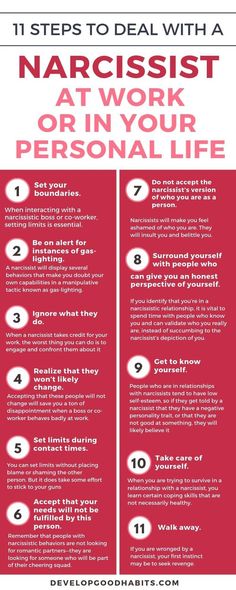 nine0004
nine0004
Although the Narcissist shows no interest in the feelings of others, recent research suggests that this trait is more flexible than previously thought 60 . The narcissist himself will not pay attention to the feelings of others, but he can be led to this. To convey to Narcissus that his behavior may offend someone, it is not enough just to say: "Your insults to Alex at the meeting looked very rude." In these words, Narcissus will hear only an accusation. If you squeeze a remark between the courtesies, then you can convey the essence to it. Insert important between the lines, say: “Can you imagine what Alex was like when you called her stupid? What if someone told you that?" It has already been proven that the suggestion to look at the situation from the point of view of another person sometimes works. nine0004
Another way is to show the person his own emotions. We know that fear, insecurity and awkwardness hide behind external arrogance. It is therefore useful to emphasize that no one expects Narcissus to be perfect.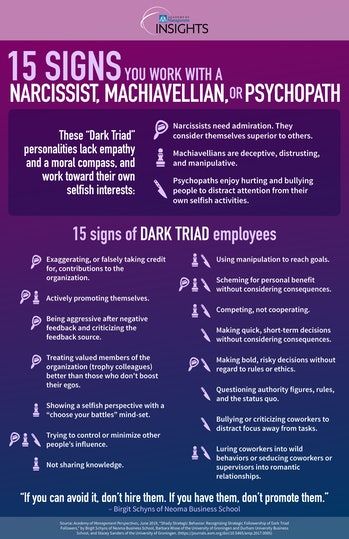 It can be mentioned that the project he is working on is really very complex. The secret is not to single out the Narcissist from the environment, not to make him feel underestimated. For example, try saying, “We are all nervous about the impending deadline. I'm very worried that I won't make it on time." This can be regarded as: “It is clear that you are nervous! We're all a little out of our minds. Do not pout". Such statements can slightly weaken the defense, allow the Narcissist to breathe a sigh of relief and distract from constant self-defense. But phrases like “You are so tense. Are you worried that you can't do it?" - a real disaster, because it is interpreted solely as an attack. nine0004
It can be mentioned that the project he is working on is really very complex. The secret is not to single out the Narcissist from the environment, not to make him feel underestimated. For example, try saying, “We are all nervous about the impending deadline. I'm very worried that I won't make it on time." This can be regarded as: “It is clear that you are nervous! We're all a little out of our minds. Do not pout". Such statements can slightly weaken the defense, allow the Narcissist to breathe a sigh of relief and distract from constant self-defense. But phrases like “You are so tense. Are you worried that you can't do it?" - a real disaster, because it is interpreted solely as an attack. nine0004
If there is a Narcissus in the team, the management may resort to certain structural changes. For example, do not single out an employee, set tasks that will help the Narcissist's subordinates, and encourage successful teamwork. Emphasize the strengths of the person to help him regain respect in the eyes of colleagues after skirmishes. A narcissist can be successful where short-term human contact is expected. For example, in sales or consulting activities, where there is a constant flow of customers. For him, this is better than being surrounded by those who are constantly forced to endure his obnoxious nature. Narcissists are sometimes very farsighted in their actions to achieve success and the steps necessary to achieve this. Their confidence drives the company forward. In these positions, they know how to make the right impression on clients in just a few minutes, because they need to show their best side. nine0004
A narcissist can be successful where short-term human contact is expected. For example, in sales or consulting activities, where there is a constant flow of customers. For him, this is better than being surrounded by those who are constantly forced to endure his obnoxious nature. Narcissists are sometimes very farsighted in their actions to achieve success and the steps necessary to achieve this. Their confidence drives the company forward. In these positions, they know how to make the right impression on clients in just a few minutes, because they need to show their best side. nine0004
The narcissist would benefit from a short course in anger management or behavior control. This will help him look at his demonstrative antics from the other side. Group therapy sessions can also help. They learn how to interact better with others. Cognitive therapy is also applicable in cases of outbursts of anger and behavioral disorders. Severe forms of narcissistic personality disorder usually require a lengthy course of psychoanalysis.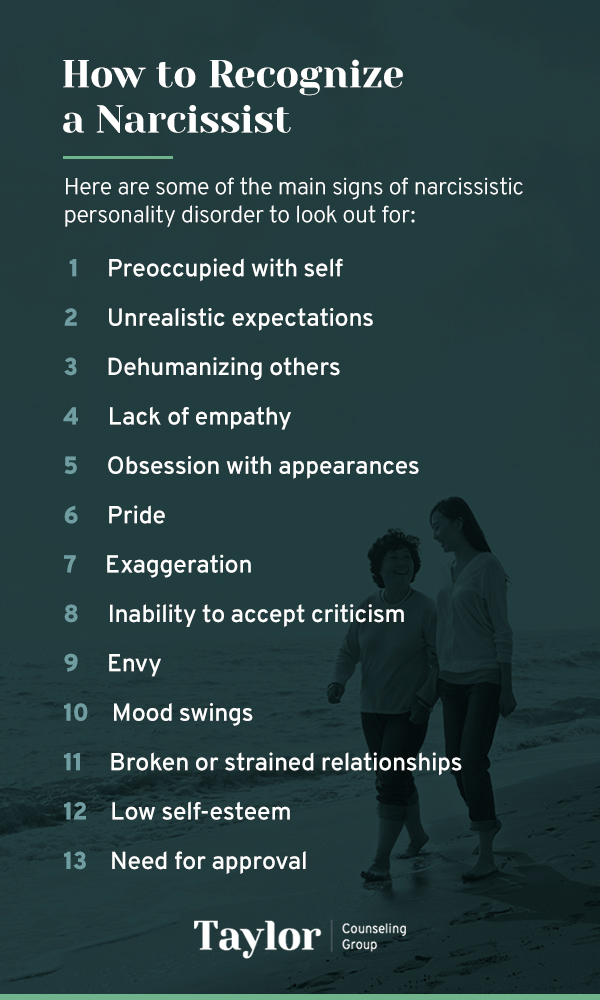 The purpose of the sessions is to help a person change a behavior pattern based on increasing self-esteem by demonstrating their superiority. nine0004
The purpose of the sessions is to help a person change a behavior pattern based on increasing self-esteem by demonstrating their superiority. nine0004
Narcissus finds it incredibly difficult to agree to treatment. It can undermine his inflated ego. By contrast, avoiding therapy will protect you from having to admit your own shortcomings. Faced with categorical conclusions from management, Narcissus often denies the existence of a problem and blames colleagues for the difficulties that have arisen 48 .
A course of psychotherapy The Narcissus is best thought of as helping them to achieve better results or overcome depression. The narcissist often worries that reality is far from his dreams, and from this point of view, treatment may interest him. However, the prospect of contacting a specialist awakens new fears: talking about your emotions, being frank, listening to accusations. Remember: the Narcissist needs to be involved in the process. Narcissists are known to be prone to interrupting therapy early.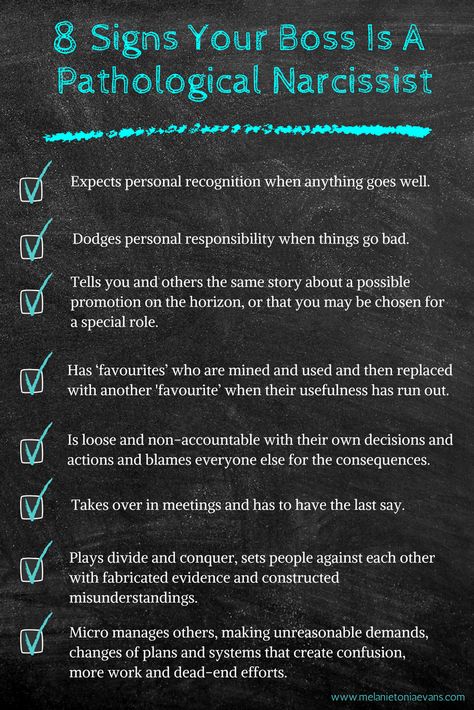 But the path to recovery involves realizing the other side of a person's desperate attempts to increase self-esteem. To do this, you need to face the truth and join the process. nine0004
But the path to recovery involves realizing the other side of a person's desperate attempts to increase self-esteem. To do this, you need to face the truth and join the process. nine0004
In long-term treatment of pathological narcissism, the relationship between patient and doctor is often interrupted. And then they recover. And so many times. In a safe environment. This helps a person to feel that he is valued, understood, they will not turn away from him. To some extent, the same behaviors that caused the problem are used as a means of solving it. The doctor calls the patient, who last week ran out of the office, calling him a "donkey", and invites him to return to the sessions. This takes a lot of time. But this is the only way to correct obvious flaws in self-esteem. Little by little the patient begins to feel accepted for who he is and weakens the defense mechanisms of his ego. First with the doctor, and then at the workplace. nine0004
When it comes to knife-throwing—that is, intervention is necessary—it is especially important for management to set clear limits and outline the possible consequences.